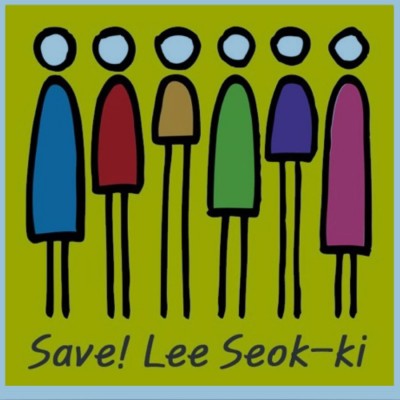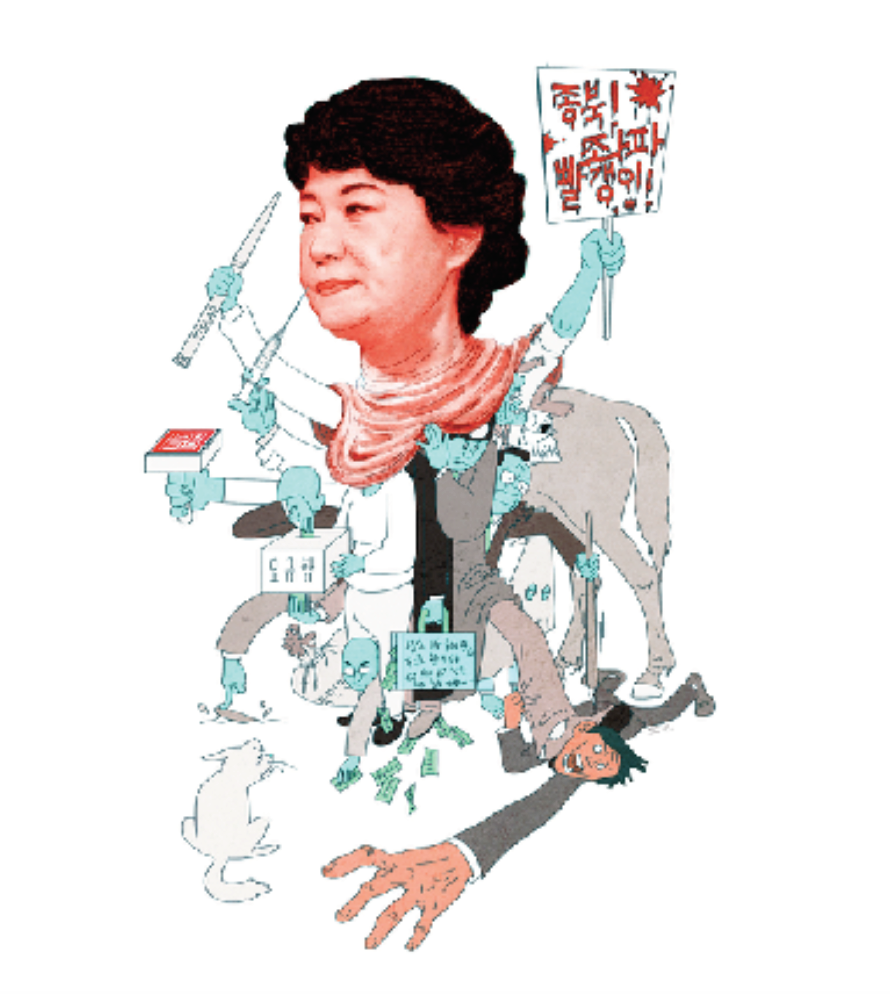South Korea’s President Park’s “Worst Crime”
The Korean Committee in Solidarity with the Victims of the "Lawmaker Lee Seok-ki Insurrection Conspiracy Case"

The Unified Progressive Party(UPP) represented a democratic ‘alternative’ that was qualitatively different from the pro-conglomerate neoliberalism or the social liberalism of institutional opposition parties. Is it possible to forcibly dissolve alternative political forces supported by specific social classes even in democratic society? The defendants were found to have no real ‘created’ RO (“Revolutionary Organization”), and a terrible charge of so-called ‘insurrection conspiracy’ was found not guilty.
It is natural for a politician, who came to power of presidency by mobilizing the law and then had no ‘achievement’ except for undermining democracy and judicial justice to step down when the ‘secret’ of administration got found out. But was it only Park Geun-hye who killed democracy and judicial justice?
Through ‘Choi Soon-sil Gate’, we were able to realize one important fact. In fact, we did not have a ‘government’ in the sense of textbooks. If the government is a public institution that collects public interest, the administration of Park Geun-hye is far from the government. To be precise, the Park administration was close to a private organization that illegally took control of the bureaucracy system by the illegal method, intervention of the National Intelligence Service in the Presidential Election. This private organization, which swindled power, served as a key link in the process of state privatization by large corporations, which had already been under way for some time.
As Choi and his foundations were collecting money from big corporations, the licenses and laws needed for large corporations were whomped up by the government. In this structure, there was no room for consideration of the public interest. If the Republic of Korea is a corporation with large chaebol and bureaucrats who are major shareholders in the corporation, the ‘Choi Soon – sil Gate’ will be the case of malpractice that some major shareholders, managers, and manager ‘s aides conspire and sacrifice the managing the corporation for their selfish interests and desires. However, in the case of Korea Inc., which is rarely seen as being publicly owned, this is a structural issue. Because there are very few devices that can control the ambition of major shareholders and managers.
The Republic of Korea is generally a low-criminal society. For example, the murder rate (the number of murders per 100,000 population) is lower than European welfare states such as Sweden and Denmark. If an ordinary person commits a crime, he or she will be legally punished and must live a lifetime as a second citizen. However, a private organization that took over state power does not bear any responsibility for continuing to commit crimes.
Even if you want to simply list ‘policies’ of the Park Geun-hye administration which are prone to crime, you need several sheets of paper. It makes to feel heavy in heart even when the ‘policies’ that made numerous victims are simply enumerated – the delinquency of duties when the Sewol Ferry sank, the indefinite postponement of wartime operational control which means abandoning the national sovereignty, the real estate measures which raise the rent of the public not having their own homes, the use of sprinkler truck in the protest depriving the life of the farmer Baek Nam-ki, the national history textbook which trampled the democracy and the diversity … However, among all these discordants, it is remarkable that the ‘Lee Seok Ki case’ of 2013 ~ 14, the legal dissolution of the Unified Progressive Party, which was the second opposition of the parliament, and the arrest and trial of Lee Seok-Ki. With this case, the formal and procedural democracy, which was achieved by the democratization movement in 1987, suffered a wound that was hard to recover. In fact, it would be impossible to call the Republic of Korea a democratic nation after the case of ‘Lee Seok-ki’.
At least in the democratic nation, there is a space of legitimate activity for the popular forces that differ from their rulers’ thought. In Korea in early 2010’s, the Unified Progressive Party was the largest force out of such popular forces. The number of party members reached 100,000, the rate of votes in the general election was about 10%, and 13 seats were held.
Many of the party ‘s executives were influential in labor unions and civic groups, and Lee Jung-hee, a representative of the party, was a famous politician who had popular appeal. The party’s distinctive support base was some organized workers and some 30 to 40-year-old people who had been highly educated and experienced political struggles during their school years. And the platform of the party, which is a mixture of social democratic redistributive policies and demands for the completion of the nation-state (withdrawing US forces and a series of policies toward the unification of the two Koreas), generally and accurately expressed the interests of the supporters. The redistribution policy, that is, the increase in various social wages (welfare costs) is advantageous for the employees. And aiming the nation-state and the distance from the US, which is the base of global neoliberalism, has inseparable relationship with enhancing national redistributive ability.
In short, the UPP represented a popular “alternative” in real politics which is qualitatively different with the ruling party’s pro-chaebol neoliberalism or the social liberalism of institutional opposition. Is it possible, then, to forcibly dissolve alternative political forces supported by particular social classes in a democratic society?
Along with democracy, it is the judicial justice that has been sacrificed to the private sector that took over the state. Although the characteristics of a democratic state are the independence and political neutrality of the judiciary, the Constitutional Court, which forcibly dissolved the UPP and deprived the parliamentary members of the national assembly, was already not politically neutral. The most explicit case of political suppression disguising as justice was the trials of several members of the UPP, including Lee Seok-ki, Kim Hong-yeol, Lee Sang-ho, Cho Yang-won, Hong Sun-suk and Kim Geun-rae. During the trials, the core parts of the NIS and prosecution allegations turned out to be false in fact. It was revealed that the existence of “RO(Revolutionary Organization)” had not been real, and the charge of insurrection conspiracy was found innocent.
At the time of the arrest of Lee Seok-ki, the “North Korea-related” issue, which was highlighted by the media, was not found anywhere. However, Lee Seok-ki was sentenced to 10 years in the first trial and 9 years in the appellate court. The content of his “crime” mentioned in the verdict was – except for the violation of the National Security Law which the world considers to be anti-human – insurrection provocation. What is it that a murderer or a rapist is sentenced to a heavy sentence just according to the recording file in 90 minutes lecture for 120 people if it is not a static elimination that pretends to be justice? In addition, there is only a thought that these trials have informed the death of justice in law, considering that the file had been fabricated by the public security agencies.
At this moment of writing, I hear a strong shout of “Step Down, Park Geun Hye!” in every domestic city. It is natural for a politician, who came to power of presidency by mobilizing the law and then had no ‘achievement’ except for undermining democracy and judicial justice to step down when the ‘secret’ of administration got found out. But was it only Park Geun-hye who killed democracy and judicial justice?
I am reading a book <Icarus’s prison>, a recently published on the ‘Lee Seok Ki Insurrection Conspiracy Case’. Reading this book which carefully collected almost every data related to the case, it is easy to see that there were many collaborators in the democracy and democratic demolition of Park Geun-hye’s private organization.
In the process of ‘Lee Seok-ki’ trial, there was no reality of RO, and it was revealed that the event where the problematic lecture was held was not a ‘secret meeting’ but a regular party event. However, at that time, <Chosun Ilbo> and <Hankook Ilbo> and other many media reported the novel ‘Lee Seok-ki Insurrection Conspiracy’ written by the National Intelligence Service as if it were true. If the intelligence agencies and the press get an alliance between them and they hunt opponents together, will the democracy and common sense in basic human rights remain completely? The principle of innocence, a human rights common sense in a democratic country, was destroyed by the media reporting a groundless charge as a conviction.
Another bastion of democracy, the National Assembly, held two hands in front of the pro north-witch-hunting. On Sept, 4, 2013, the opposition votes for the Lee Seok-ki arrest proposal in the National Assembly was only 14. The atmosphere was severe enough for the Democratic Party and the Justice Party, which are opposition parties, as well as the ruling party to decide to vote yes. The opposition parties that are urging Park Geun-hye’s resignment at this time were in fact helping Park Geunhye’s opponent to be removed. The judiciary, including the prosecutors and judges, was leading the pro-north-hunting of Park Geun-hye which are anti human rights.
In the background where the Park Geun-hye gang was able to easily commit such anti-democratic and anti-human rights violence, including the ‘Lee Seok-ki Incident’, there was age-ole anti-democratic and anti-popular characteristics of mainstream in Korea. It seemed that people from high-ranking public officials, the mass media to the constitutional opposition party were much more afraid of political power of the public than the privatization of the state by chaebol and Park Geunhye – Choi Soon-sil gang. If we want a full-fledged change, we should demand the resignation of the president and the releasing prisoners of conscience including the victims of Lee Seok-ki as well as calling collaborators to Park Geun-hye’s gang to account.


